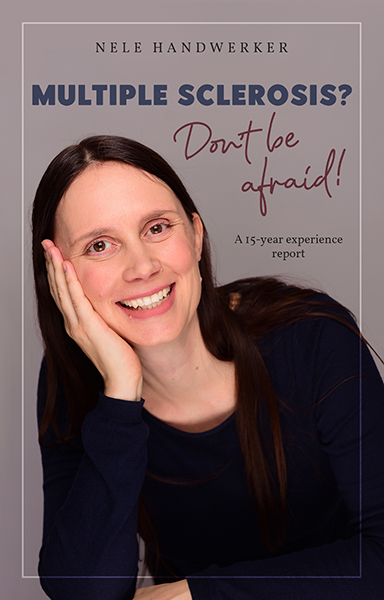Today we’re talking about fatigue, an invisible MS symptom with a big impact on daily life. The article is part of the series about MS symptoms. What is chronic fatigue? What factors cause fatigue? And what is the best thing to do about it?
Klicken Sie auf den unteren Button, um den Podcast zu laden.
Table of Contents
When does chronic fatigue occur?
Often already at the beginning of the disease. It can also become noticeable later in the progression of multiple sclerosis. Overall, 4 out of 5 MS patients are more or less affected by fatigue.
Which areas of life does fatigue affect?
Fatigue can affect the entire body, but also the mental abilities. Physical efforts become a big hurdle and the intellectual capacity is reduced. It can be difficult for you to follow a conversation, to concentrate on your job, to go for a longer walk and much more. Thus, fatigue affects the participation in social life, but also the ability to work..
What’s causing it?
On the one hand, MS lesions that lead to slower transport of stimuli and signals via the damaged nerve pathways. In addition, there is an altered metabolism.
There are also indirect influences. When you have poor vision, or balance issues, to name just two, your body needs extra energy to compensate. The same applies to pain, psychological tension or high temperatures. All effects or negative influencing factors on MS rob you of energy, which is then lacking elsewhere and increases fatigue.
If you take many medications, one or more of them may increase your fatigue because they make you tired. Discuss your fatigue issues with your doctor so that he or she can review your medications for this issue. Often there are multiple modes of action, so one medication may be replaced by another or dosed lower. Or an interaction may cause undesirable side effects. The medical experts can certainly help you.
How do you best deal with fatigue?
Because fatigue is one of the invisible symptoms of MS, for a long time it didn’t get any attention in treatment. Fortunately, that has improved. However, it remains difficult to explain fatigue to outsiders. Many confuse fatigue with normal tiredness because that’s what they know. One small advantage is certainly that Covid-19 can also lead to fatigue and the problem of chronic tiredness has now become known to a wider public.
What helps with chronic fatigue?
A conscious lifestyle with healthy food is good for you. Drink enough, at least two liters a day, preferably water or unsweetened teas, and more if it is hot or if you are exercising.
When eating, make sure you eat a varied and high-fiber diet with unsaturated fats, low sugar, low salt, and fresh unprocessed ingredients.
Furthermore, you should give yourself regular breaks. Experiment with length, duration, frequency and type of break to find your optimum. The recommendation for a power nap is to make sure it’s 20 min, max. 30 min long. I set an alarm on the days I allow myself a power nap and am always surprised at how much recovery such a short break can bring.
Keep your body from overheating in the summer by wearing appropriate clothing. There are suppliers who, with the help of innovative fabrics, store water in clothing for several hours and thanks to the evaporative cooling, contribute to cooling. Cooling vests, scarves and headgear are popular. Of course, you can simply use the evaporative cooling yourself by wetting your clothes a bit, but please be careful especially near the sensitive kidneys or on the head. An infection in summer is no fun.
Maybe you can be flexible with your time and use the midday heat for a break like in southern countries.
Sport gets you going
In any case, sports and exercise help. Especially endurance sports like jogging, swimming or cycling are good. Don’t be afraid to take up an e-bike or go Nordic walking with poles to stabilize your gait at the same time. Full-body workouts such as yoga, Pilates, and exercise to music such as salsa or hip-hop will help you combat chronic fatigue. Start slowly and gradually increase your workload so that you don’t overexert yourself right from the start, avoid injuries, and stay motivated for the long term.
Visit www.mssociety.org for tips and recommendations on exercises that take into account any physical limitations you may have. You can find more suggestions at www.shift.ms.
Or ask your physiotherapist or during your rehab for suitable exercises.
If you find it difficult to overcome your inner resistance, try to make an appointment with others to exercise together. Lay out your sports gear in the evening and build your sports program into your existing habits.
What is the best prevention against fatigue?
The disease-modifying therapy (DMT), which at least greatly slows down multiple sclerosis and, if possible, completely stops disease activity. Currently, there are several levels of efficacy.
Level one is the basic therapy for mild courses where lower efficacy is sufficient. However, there are also much more effective therapies that interfere more effectively with the immune system to treat active and highly active forms of MS. There is also stem cell therapy as the final escalation step of treatment, but it is suitable only for a very special group of people and has should be done early in the disease course.
For cognitive fatigue, the rule is, exercise your brain. This can be done in a number of ways. By learning a new language, using apps, or going deep into a topic where you learn a lot of new things.
What else can you do against fatigue?
Get plenty of fresh air every day, in daylight. Thirty minutes is a good minimum, but more is welcome. If you exercise during this time, you will benefit twice as much from the increased oxygen supply.
If you smoke, try to quit as soon as possible. Smoking worsens your prognosis in multiple sclerosis. Alcohol should also be consumed only in small amounts or not at all.
Take care of soul and spirit
If your mind is bothering you, seek help. Psychotherapy can resolve many old problems and ways of thinking that are troubling you. Maybe a discussion group is the right thing for you or techniques from writing.
In any case, you should focus on the positive things, on all that you have accomplished and still can do. For this you can use a success diary that you fill with entries every day.
Another alternative is the happiness diary, in which you write down all the moments of the day that made you happy, like the squirrel you saw, the beautiful sunrise, the delicious tea, …
Education helps
Last but not least, a word of advice: address fatigue where it comes into play. This avoids misunderstandings. Of course, you may have to explain several times what chronic fatigue is doing to you. And your counterpart may need tips on how working together works best for you. This makes sense in a personal context, but it also makes sense in a professional context.
If people know you need breaks or can’t fully attend a meeting, they may understand. Without an explanation, there are a lot of questions and uncertainties. And at home, a household helper could take some of the work off or tasks could be divided among several people.
Creatively, solutions can be found.
Stay as healthy as possible, well informed and try to make the most of your life,
Nele
Get more information and positive thoughts in my free newsletter.
If you like the podcast, subscribe now to never miss another episode. By the way, you can find an overview of all previously published episodes here.
I am always happy to receive feedback, suggestions and questions. Also feel free to send me a picture of where and when you listen to my podcast or read the posts to nele@ms-perspektive.com or use the contact form. That makes it more of an interactive exchange.

And at many more places.
* This text contains affiliate links. This means that I get a small compensation if you buy the product recommended by me through the link. For you nothing changes in the price of the product. And it helps me to pay for the blog and to write new posts.










